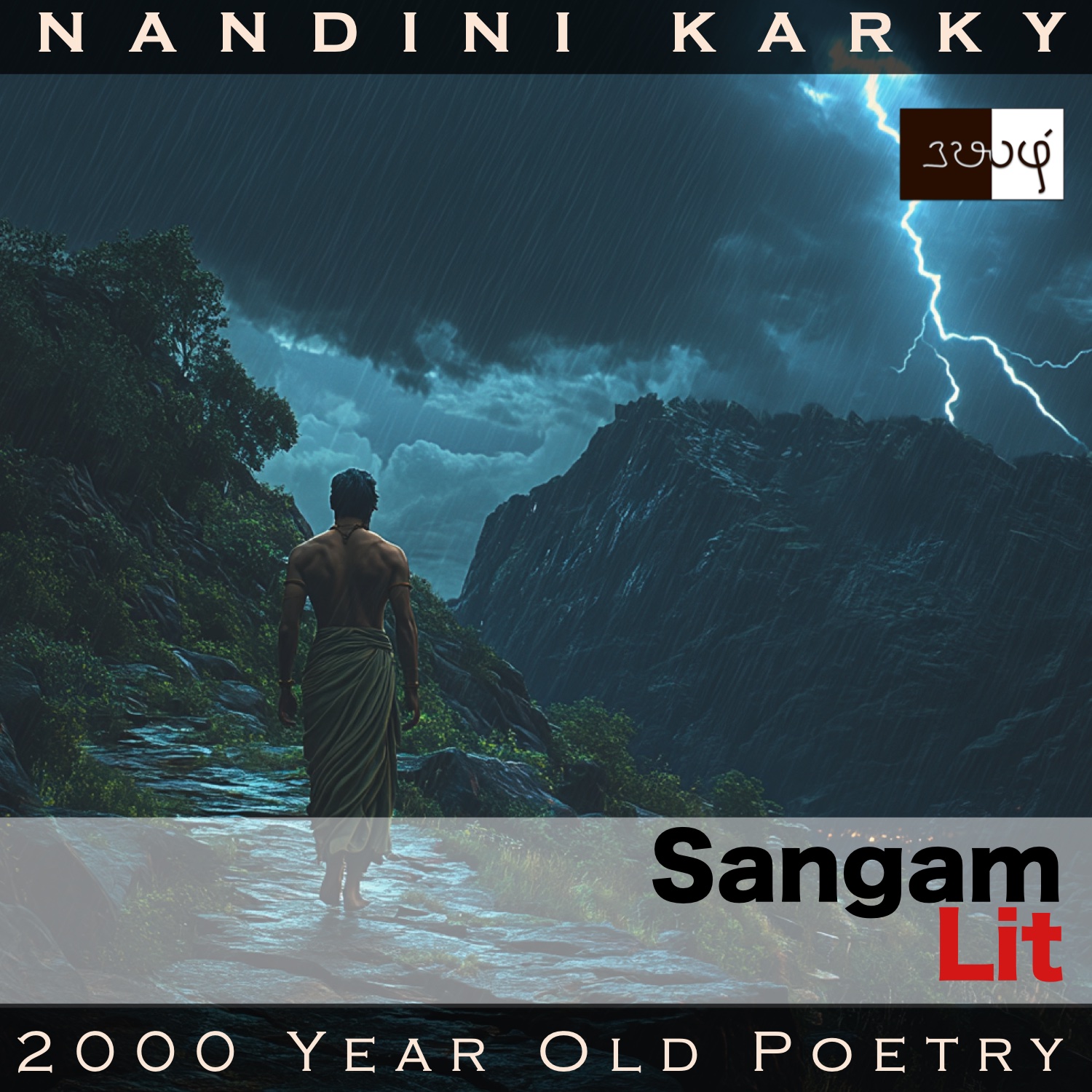Podcast: Play in new window | Download
Subscribe: Apple Podcasts | Spotify | Amazon Music | Android | iHeartRadio | TuneIn | RSS | More
In this episode, we perceive clear arguments mentioned to persuade a person, as portrayed in Sangam Literary work, Kalithogai 49, penned by Kabilar. The verse is situated in the ‘Kurinji’ or ‘Mountains landscape’ and reveals the dangers in a tryst by night.

கொடுவரி தாக்கி வென்ற வருத்தமொடு
நெடு வரை மருங்கின் துஞ்சும் யானை,
நனவில் தான் செய்தது மனத்தது ஆகலின்,
கனவில் கண்டு, கதுமென வெரீஇ,
புதுவதாக மலர்ந்த வேங்கையை
‘அது’ என உணர்ந்து, அதன் அணி நலம் முருக்கி,
பேணா முன்பின் தன் சினம் தணிந்து, அம் மரம்
காணும் பொழுதின் நோக்கல் செல்லாது,
நாணி இறைஞ்சும் நல் மலை நல் நாட!
போது எழில் மலர் உண்கண் இவள்மாட்டு நீ இன்ன
காதலை என்பதோ இனிது மற்று இன்னாதே,
மின் ஓரும் கண் ஆக, இடி என்னாய், பெயல் என்னாய்,
இன்னது ஓர் ஆர் இடை, ஈங்கு நீ வருவதை
இன்புற அளித்தனை இவள்மாட்டு நீ இன்ன
அன்பினை என்பதோ இனிது மற்று இன்னாதே,
மணம் கமழ் மார்பினை, மஞ்சு இவர் அடுக்கம் போழ்ந்து,
அணங்குடை ஆர் இடை, ஈங்கு நீ வருவதை
இருள் உறழ் இருங் கூந்தல் இவள்மாட்டு நீ இன்ன
அருளினை என்பதோ இனிது மற்று இன்னாதே,
ஒளிறு வேல் வலன் ஏந்தி, ‘ஒருவன் யான்’ என்னாது,
களிறு இயங்கு ஆர் இடை, ஈங்கு நீ வருவதை
அதனால்
இரவின் வாரல், ஐய! விரவு வீ
அகல் அறை வரிக்கும் சாரல்,
பகலும் பெறுவை, இவள் தட மென் தோளே.
A different style of insisting to the man ‘Marry her, marry her’! The words can be translated as follows:
“After attacking the tiger with curving lines and winning over it, the exhausted elephant sleeps in the slopes of the tall mountains. Seeing the imprint of what it did in its conscious state as a dream, it suddenly rises with agitation. Then seeing a ‘Kino tree’, blooming with fresh flowers, thinking it’s that enemy standing there, it destroys the fine beauty of the tree with its mighty strength. After its rage has abated, whenever it comes by that ruined tree, without looking at it, with a head bowed in shame, the elephant wanders away in the fine mountain county of yours, O lord!
That you have so much love towards her, the one with kohl-streaked eyes, having the beauty of a blossomed flower, is sweet indeed. But you coming here, as lightning streaks across the sky, on that formidable path, without minding the thunder or the downpour, is very much distressing!
That you have so much affection towards her so as to render your sweet graces is sweet indeed. But you coming here, with a fragrant chest, penetrating through the mountains, surrounded by clouds on that formidable path, where fearsome spirits roam about, is very much distressing!
That you have so much kindness towards her, the one with black tresses akin to darkness, is sweet indeed. But you coming here, bearing a radiant spear in your right hand, all alone, on that formidable path, where elephants rove around, is very much distressing!
And so, come not at night, O lord! In this wide mountain slope, spreading with fallen flowers, may you delight in her soft and curving arms in the day too!”
Time to explore the nuances. The verse is situated in the context of the man’s love relationship with the lady, prior to marriage, specifically around the theme of trysting and these words are rendered by the confidante to the man. The confidante starts by describing the man’s mountain country with an interesting scene. What has transpired is something we have seen in many verses and that’s a fight between the tiger and the elephant. In this case, the elephant emerges victorious and after that exhausting ordeal, is resting in the mountain slopes. Suddenly, seeing whatever it had been doing for real a while ago in a dream, the elephant rises up with fury and then spotting a Kino tree with bright yellow flowers, mistaking it to be a tiger, the elephant dashes against it, destroys it in a moment of passion, and then afterwards, whenever it comes on that path with this ruined tree, it would not even dare to look at the tree, and walk away, head bowed in shame.
After that dynamic scene to describe the man’s country, the confidante mentions how sweet it is of the man to render his love, kindness and grace to the lady but doing that in the dark hour of night, walking on a path that was filled with the dangers of heavy downpours, fearsome sprits and roving elephants was a thing of concern. So, she requests the man not to tryst at night and instead find the way to delight in the lady’s company even during the day. Through this, she nudges the man to give up temporary trysting and instead seek the permanent path of happiness by claiming the lady’s hand.
The highlight of this verse is that modern understanding of a dream that we can perceive from this verse. A dream is not considered as something sent by the Gods or an event that foretells the future. Rather the clear understanding that what we see in a dream is nothing more than a reenactment of whatever has happened in reality, especially the more dramatic events of our life, is seen in this verse from two thousand years ago! Going further, that act of ruin done in a moment of passion, and later, the regret that comes because of this, all projected on the actions of that animal, engraves the nuanced understanding of the human mind by the people of the Sangam era!




Share your thoughts...